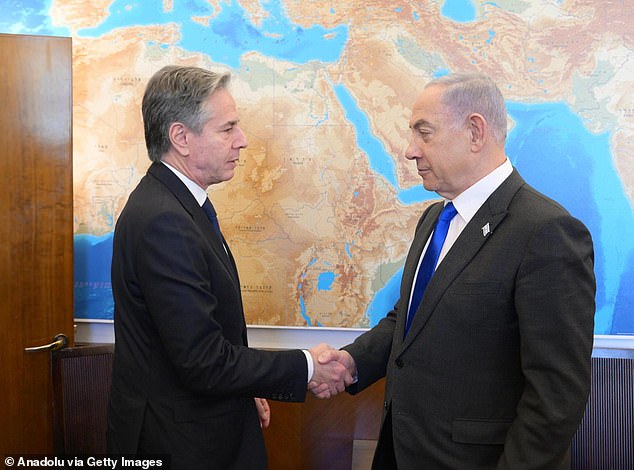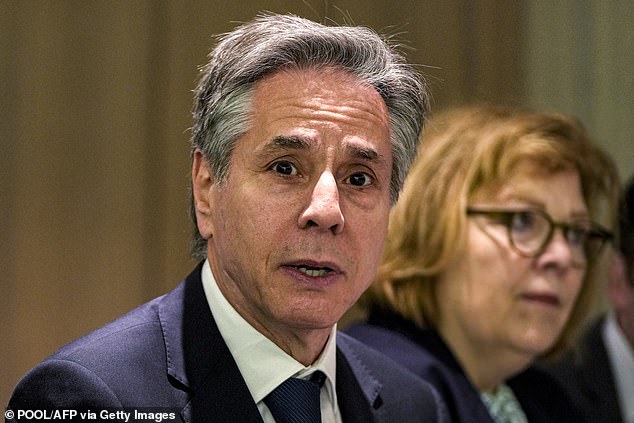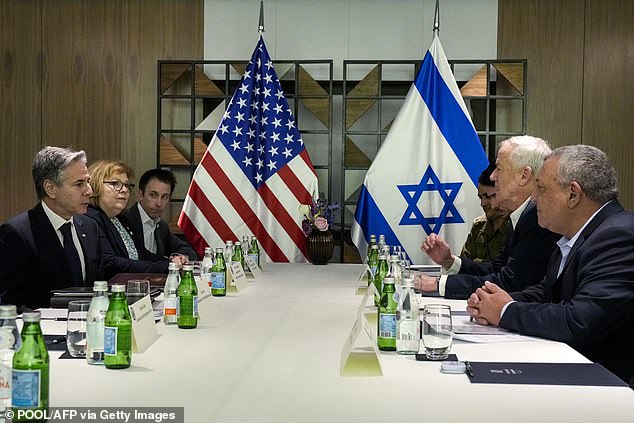- Blinken met with moderate members of Israel’s war cabinet on Thursday as negotiations continue for the release of hostages after Netanyahu criticized Hamas’ latest offer.
Secretary of State Antony Blinken discussed ways to secure the release of Gaza hostages with moderates in Israel’s war cabinet on Thursday, a day after Prime Minister Benjamin Netanyahu rejected Hamas’ demands as “delusional.”
Blinken met in Tel Aviv with Benny Gantz and Gabi Eisenkot, two former military chiefs who joined Netanyahu’s war cabinet after the October 7 attack on Israel by Hamas fighters.
The talks will focus on ‘the hostages and the strong desire that we both have to see them returned to their families, the work that is being done to that end,’ Blinken said as he opened the meeting.
“The most pressing issue is, of course, finding ways to bring the hostages back,” Gantz told Blinken.
“Once this is done, many things can be achieved,” he said.
Earlier, Netanyahu criticized the terrorists’ demands as “bizarre” and said accepting them would “only invite another massacre” when they are “a finger’s breadth away from a decisive victory.”
Secretary of State Antony Blinken meets with former Israeli Army Chief of Staff Gadi Eisenkot and former Israeli Defense Minister Benny Gantz on Thursday morning.

In a meeting with Netanyahu a day earlier, the Israeli prime minister said the only hope for peace was a “total victory.”
But in a sign that they were still open to negotiations, he added that his officials “haven’t really committed to anything” in terms of the details of the deal.
Hamas had outlined the most detailed plan yet for a deal that would free all the hostages in exchange for 1,500 Palestinian prisoners and an end to the war.
He proposed three 45-day release phases, starting with all women, male civilians under 19, the elderly and the sick in exchange for some of the Palestinian prisoners.
The IDF would then have to withdraw from populated areas and cease air operations before the male soldiers are released in exchange for other convicts.
Blinken traveled through the Middle East on his fifth visit since the war between Israel and Hamas began, and brought to Israel a response from Hamas through Qatar to a hostage deal.
But Blinken said he still saw room for negotiations to improve the deal and secure the release of the hostages.
Israel has made the destruction of Hamas’s military and governance capabilities one of its wartime goals, and Hamas’s proposal would effectively leave it in power in Gaza and allow it to rebuild its military capabilities.
Blinken downplayed the stance and said it was part of the arduous negotiation process. ‘It’s not flipping a light switch. It’s not a yes or no,’ he stated.

Blinken has downplayed Netanyahu’s comments, saying the entire process “is not about flipping a light switch.”
Blinken is trying to push ceasefire talks while pushing for a broader postwar deal in which Saudi Arabia would normalize relations with Israel in exchange for a “clear, credible, time-bound path to the establishment of a Palestinian state.” “.
But the increasingly unpopular Netanyahu opposes the creation of a Palestinian state, and his hardline governing coalition could collapse if he is seen as making too many concessions.
“Although there are some clear failures in Hamas’s response, we believe it creates space to reach an agreement, and we will work on it tirelessly until we get there,” he said.
The war in Gaza was triggered by Hamas’ unprecedented attack on Israel on October 7, which killed about 1,160 people, mostly civilians, according to an AFP tally based on official Israeli figures.
Israel vowed to eliminate Hamas in response and launched airstrikes and a ground offensive that have killed at least 27,708 people, mostly women and children, according to Gaza’s Health Ministry.
The militants also took around 250 hostages on October 7. Israel says 132 remain in Gaza, of whom 29 are believed to have died.

